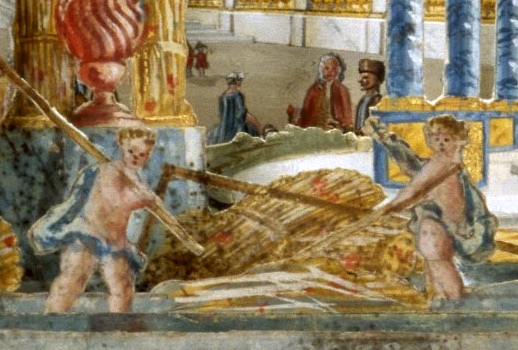
Rameau was known best as a musical theorist until his first opera, the towering Hippolyte et Aricie, premiered in 1733 just after his 50th birthday. His bold use of harmony and inventive orchestral colors rocked the French musical world and for the next 30 years he controversially dominated the opera scene with his many tragédies lyriques and operas-ballets. Today he is probably best known for his sui generis comedy Platée about a vain, love-sick water nymph, played by a tenor in drag.
Les Boréades was in rehearsals when Rameau died in 1763 but its premiere was canceled for reasons that remain unclear. Apparently a private performance was given a few years later but otherwise the score remained tucked away until French Radio exhumed it in 1964 to commemorate the 300th anniversary of the composer’s birth. I have never turned up a copy of that broadcast but it seems to have attracted little notice and so Les Boréades had to wait for Gardiner, a passionate Ramellian, who first performed it in 1975.
Fittingly Gardiner also conducted that first staging at the 1982 Aix-en-Provence Festival, a production which formed the basis of the Erato recording unfortunately currently out-of-print. Today’s podcast features that recording’s leading lady Portuguese soprano Jennifer Smith, a Gardiner favorite, and tenor Paul Elliott as the wind-crossed lovers Alphise and Abaris.
Queen Alphise must marry a descendent of Boréas, thgge god of the North Wind, in order to retain her throne. Of course, deus ex machina Apollo reveals at the finale that her beloved Abaris is indeed a wind-son and all ends happily, as it must. If not his most dramatically compelling work, Rameau’s score nonetheless features some of his most astonishing pages, such as the brilliant storm which strikes at the end of the third act and the sublime Entrée de Polymnie which Gardiner has called “perhaps the most melting and gravely sensual writing for orchestra to emerge from the entire Baroque era.”
I caught the work’s 1982 US premiere at New York’s Town Hall by a short-lived group called Opera Rediviva with Ruth Welting as Alphise; it proved an earnest, if uneven afternoon. Les Boréades has since been taken up by Sir Simon Rattle, Marc Minkowski (whom I heard conduct it in Lyon) and William Christie who brought the ultra-chic Robert Carsen production (still available on DVDRameau: Les Boréades
Proms at Royal Albert Hall
29 August 1978
Alphise: Jennifer Smith
Sémire/Nymph: Anne-Marie Rodde
Polimnie: Emma Kirkby
Abaris: Paul Elliott
Calisis: Jean-Claude Orliac
Borilée: Christopher Booth-Jones
Borée: Alain Fondary
Adamas: Pierre-Yves Maigat
Monteverdi Orchestra and Choir
John Eliot Gardiner, conductor
“Trove Thursday” will be taking off Christmas Eve but returns on New Year’s Eve with some rare Rossini. In the meantime, Les Boréades and all previous “Trove Thursday” offerings are available for download from iTunes or via any RSS reader.



